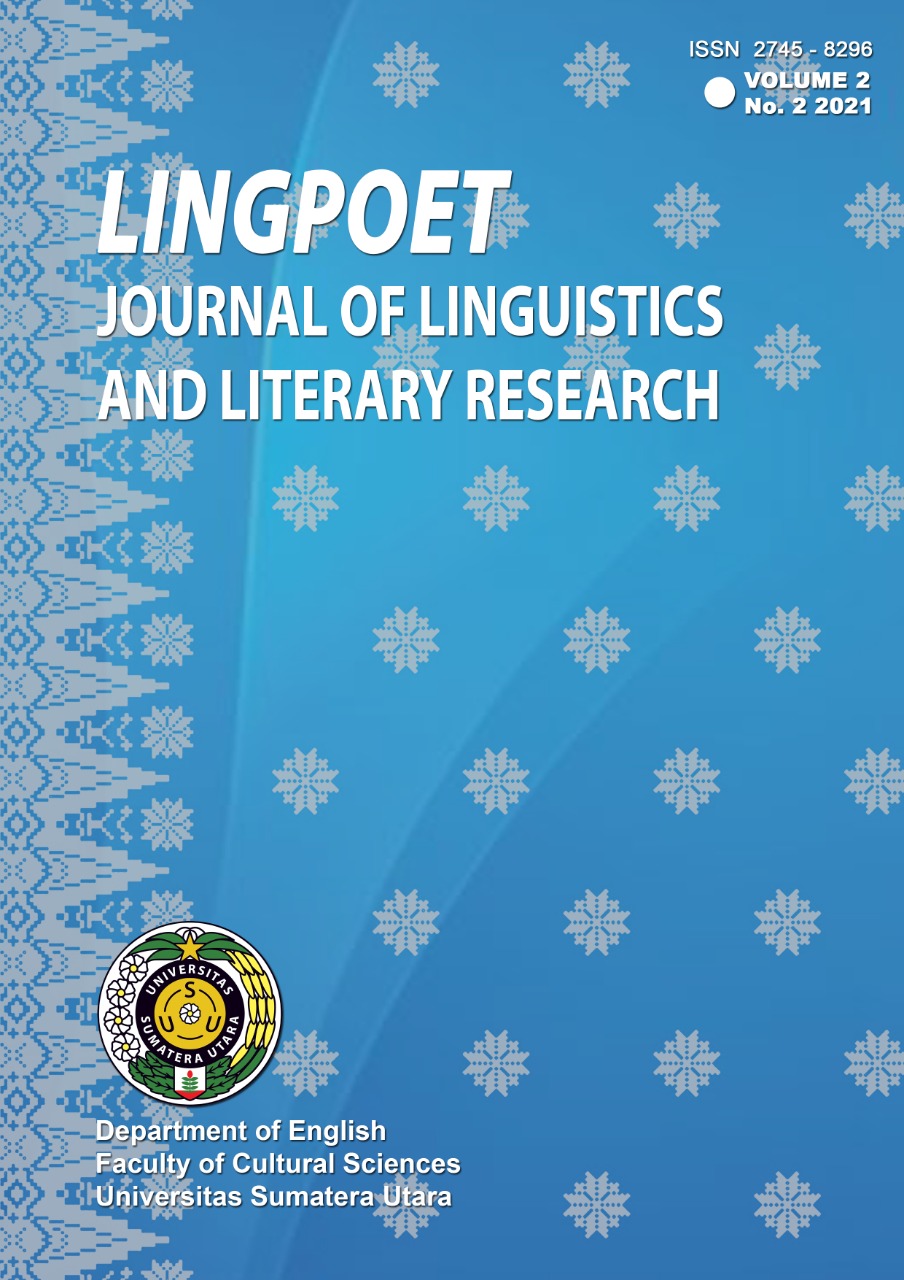The Impoliteness Strategies of Prime Minister Benjamin Netanyahu on Twitter
DOI:
https://doi.org/10.32734/lingpoet.v2i2.5757Keywords:
Bald on Record Impoliteness, Negative Impoliteness, Positive ImpolitenessAbstract
This study discusses the types of impoliteness strategies and their realization found on Prime Minister Benjamin Netanyahu's Twitter account on Twitter. The idea is used to identify and categorize different sorts of impoliteness methods, as well as how they are implemented. A descriptive qualitative technique was employed for the investigation. According to the findings of this study, Prime Minister Benjamin Netanyahu employs a variety of impoliteness tactics, which are (1) Bald on record impoliteness, (2) Positive impoliteness, (3) Negative impoliteness, and (4) Sarcasm or mock politeness. While withholding politeness was not found in the Prime Minister of the Republic of Indonesia, Benjamin Netanyahu's tweet. Imprudence is the most common category, with 11 tweets accounting for 57.90 percent of the total. Negative impoliteness is ranked second, with 5 tweets (or 26.31 percent) on the list. Next, sarcasm or fake politeness received two tweets, accounting for 10.52 percent of the total. Only one tweet, or 5.26 percent, had a positive impoliteness.
Downloads
References
Acevedo, M. (2017). The Effect of Social Media on Human Behavior Newinfluencers.com. Retrieved fromhttps://www.newinfluencers.com/the- effect-of-social-media-on-human-behavior/ (April 2019).
Anton. (2013). Bagaimana Twitter Mempengaruhipolitik [Text].
Retrieved from https://www.eyerys.com/id/forum/techtalk/337/bagaimana- twitter-mempengaruhi-politik (April 2019).
Ary, D., Jacobs, L. C., Razavieh, A., & Sorensen, C. (2002). Introduction to research in education. Belmont, CA: Wadsworth.
Bousfield, D. (2008). Impoliteness in Interaction. Philadelphia: John Benyamin’s Publishing Company.
Bousfield, D. (2007). Beginnings, middles and ends: A biopsy of the dynamics
of impolite exchanges. Journal of Pragmatics, 39(18) 2185-2216.
Bousfield, D. (2008). Impoliteness in the struggle for power. In D. Bousfield &
M. A. Locher (Eds.), Impoliteness in language: Studies on its interplay
with power in theory and practice, 127-154. New York:
Mouton de Gruyter.
Bromwich, J. E., & Barr, J. (2018) Twitter ‘s Shifting Positions on Trump ‘s Tweets. The New York Times. Retrieved from https://www.nytimes.com/2018/01/03/technology/twitter-trump-rules.html(March 2019).
Cha, M., Kwak, H., Rodriguez, P., Ahn, Y., & Moon, S. (2007). Analyzing the World’s Largest User Generated Content Video System. Paper presented at the 7th ACM SIGCOMM conference on Internet measurement (July 2019).
Christakis, N. A., & Shakya, H. B. (2017). A New, More Rigorous Study
Confirms: The More You Use Facebook, the Worse You Feel. Retrieved from use Facebook-the-worse-you-feel (Mei 2019).
Culpeper, J. (1996). Towards an anatomy of impoliteness. UK: Lancaster University.
Culpeper, J. (2005). Impoliteness and entertainment in the television quiz show:
The Weakest Link, Journal of Politeness Research: Language, Behavior, Culture.
Culpeper, J. (2011). Impoliteness: Using language to cause offence (Vol. 28). Cambridge University Press.
Dailynews. (2017). Kenya considers jail for disrespectful tweets. Retrieved from https://www.dailynews.co.zw/articles/2017/06/29/kenyaconsiders-jail-for disrespectful tweets/ (June 2019).
Highfield, T., Harrington, S., & Bruns, A. (2013). Twitter as a technology for audiencing and fandom: The #Eurovisionphenomenon. Information, Communication & Society, 16(3), 315–339. https://doi.org/10.1080/1369118X.2012.756053( June 2019).
Leech, G. N. (2014). The pragmatics of politeness. Oxford Studies in Sociolinguists. New York: Oxford University Press.
Levinson, C.S. (1983). Pragmatics. Cambridge: Cambridge University Press.
Locher, M. A. (2004). Power and politeness in action: Disagreements in oral
communication. Berlin: Mouton de Gruyter. Locher, M. A. (2006). Polite behaviour within relational work: The discursive approach to politeness. Multilingual, 25(3), 249-267.
Miles M.B., Huberman, M.A., & Saldana, J. (2014). Qualitative data analysis.
London: Sage Publication.
Mills, S. (2003) Gender and Politeness. Cambridge: Cambridge University Press.
Mirhosseini et al. (2017). Impoliteness Strategies Based on Culpeper ‘s Model: An
Analysis of Gender Differences between Two Characters in the movie
Mother. Journal of Applied Linguistics and Language Research 4 (3), 22-25.
Muralidharan K. and Sundararaman V. (2011), "Teacher Performance Pay:
Experimental Evidence from India," Journal of Political Economy 119(1),
-77. https://doi.org/10.1086/659655 (June 2019).
Newkirk, V. R. (2016, March 24). The American Idea in 140 Characters. The Atlantic. Retrieved from https://www.theatlantic.com/politics/archive/2016/03/twitter-politics-last decade/475131 (June 2019).
Tracy, K., & Tracy, S. J. (1998). Rudeness at 911: Reconceptualizing face and
face attack. Human Communication Research, 25, 225-251.
Ramsay, M. (2010). Social media etiquette: A guide and checklist to the benefits
and perils of social marketing. Journal of Database Marketing &Customer Strategy Management, 17(3–4), 257–261. https://doi.org/10.1057/dbm.2010.24 (February 2019)
Salman, A. (2017). Impoliteness Strategies in English And Arabic Facebook
Comments.Diyala University, Iraq.
Scollon, R., &Scollon, S. B. K. (2001). Intercultural communication: a discourse
approach (2nd ed). Malden, Mass: Blackwell.
Spolsky, (2008). Sociolinguistics. Oxford: Oxford University Press Van Dijk, T. A. (1997).
What is political discourse analysis. Belgian journal of linguistics, 11(1), 11-52.
Yule, G. (1996). Pragmatics. Oxford: Oxford University Press.
L, Yulidar. (2017). Impoliteness Strategies Used in Dailymail's Comments. (Bachelor Thesis). Surakarta: Universitas Muhammadiyah Surakarta.
Downloads
Published
How to Cite
Issue
Section
License
Copyright (c) 2021 LingPoet: Journal of Linguistics and Literary Research

This work is licensed under a Creative Commons Attribution-ShareAlike 4.0 International License.













